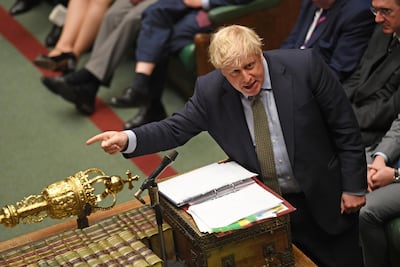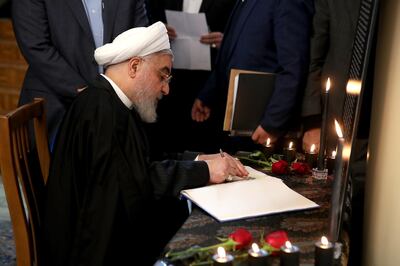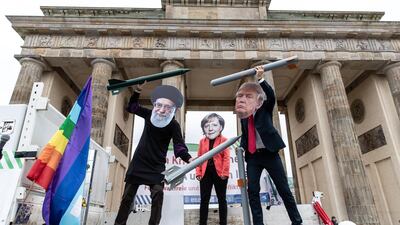The fate of the controversial deal over Iran’s nuclear programme now rests solely in the hands of the regime following this week’s decision by Europe to challenge Tehran’s decision to resume work on nuclear enrichment.
Ever since Donald Trump, the US president, announced that he was ending American participation in the deal in May 2018, the three European signatories – Britain, Germany and France – have maintained their commitment to the deal, arguing that it is the best means of preventing Tehran from achieving its long-held goal of acquiring a nuclear weapons arsenal.
But the Europeans have finally been forced to act after Mohammad Javad Zarif, the Iranian foreign minister, announced earlier this month that the country would no longer comply with commitments under the deal that restricted the number of nuclear centrifuges Iran is allowed to operate. The centrifuges are a critical component in the processing of uranium to weapons grade, and Tehran made the announcement in the immediate aftermath of the US drone strike that killed Qassem Suleimani, the Islamic Revolutionary Guard Corps commander.
The Iranian move means that the deal is effectively no longer valid, as it confirms that Iran – having already announced that it was to resume work on uranium enrichment at the end of last year – is no longer making any serious attempt to comply with key elements of the agreement.
Iran denies that it is responsible for rendering the deal void and meaningless, claiming the Trump administration was the first party to violate the agreement with its unilateral decision to withdraw, which Mr Trump insists is “flawed”.
Tehran’s response, though – which has been to actively reconstitute key components of its nuclear weapons programme – has meant that the Europeans have been faced with no other option but to formally challenge Iran’s open breaches of the deal and trigger the dispute resolution mechanism that is contained in the original agreement.

Under the terms of the mechanism, a disputation process begins that will last for 15 days. If no solution is agreed upon, then Iran could face the re-imposition of further international sanctions, with the European powers joining the US in intensifying Iran’s international isolation.
While, given Tehran’s blatant breaches of the deal, the Europeans were basically left with no other option, it is clear from the statement issued by the foreign ministers of the so-called E3 – Britain, France and Germany – that they still retain the desire to resurrect the deal.
“We have been left with no choice, given Iran’s actions, but to register today our concerns that Iran is not meeting its commitments under the JCPOA,” the statement read, referring to the deal. “The E3 remain fully committed to this diplomatic effort and intend to resume it as soon as conditions allow … Iran’s actions are inconsistent with the provisions of the nuclear agreement and have increasingly severe and non-reversible proliferation implications.”
The Europeans' lack of enthusiasm for taking the Iranians to task for their actions is clearly evident in their approach, and it has even been suggested that they acted only after the Trump administration threatened them with economic sanctions if they continued to support the deal.
Boris Johnson, the British prime minister, who appears to be keen to maintain close ties with both the Trump administration and his European counterparts in Berlin and Paris, suggested the best way of breaking the deadlock might be to replace the 2015 deal with what he called a “Trump deal”, one that addresses the flaws in the original agreement and helps to defuse tensions between Washington and Tehran.

But the issue of whether the original deal can be saved, or replaced by another one – which secures Washington’s backing – ultimately depends on how Tehran responds to the current crisis, and whether there is any appetite among the more moderate members of the regime to reopen negotiations.
The initial response from Hassan Rouhani, the Iranian president, has not been encouraging after he reacted defiantly on Wednesday to the country's mounting isolation over its nuclear activities, claiming it is now "enriching more uranium than it did before it signed the nuclear deal".
“Pressure has increased on Iran, but we continue to progress,” he added.
Just how long the regime can continue to maintain its defiant stance towards the outside world, however, will be open to question following the intense scrutiny the regime is under following its involvement in the shooting down of a Ukrainian passenger jet, killing all 176 people on board.
It is not just the national humiliation Iran has suffered over its handling of the disaster, when the regime was forced to accept, after initial denials, that it had accidentally shot down the aircraft that has damaged the credibility of the country’s ruling elite.
It is the realisation among ordinary Iranians that their country is run by leaders who are, by their own admission, incompetent that has led to a resumption of the anti-government protests that took place over the regime's poor handling of the economy.
Furthermore, the Ukrainian aircraft disaster has re-opened bitter divisions between moderate and hardline factions within the regime, with Mr Rouhani openly criticising the hardline supporters of the country’s supreme leader, Ayatollah Ali Khamenei, for provoking the latest crisis with the US.
In such circumstances, and with the threat of Iran facing even more sanctions if it continues to defy its commitments to the 2015 deal, the regime’s room for manoeuvre is limited. One way to alleviate the pressure, therefore, would be for Iran to return to the negotiating table and agree a new deal that helps end its international isolation and economic hardship.
Con Coughlin is the Telegraph’s defence and foreign affairs editor


